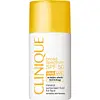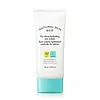What's inside
What's inside
 Key Ingredients
Key Ingredients

 Benefits
Benefits

 Concerns
Concerns

 Ingredients Side-by-side
Ingredients Side-by-side

Titanium Dioxide 6.3%
Cosmetic ColorantZinc Oxide 4%
Cosmetic ColorantWater
Skin ConditioningDimethicone
EmollientButyloctyl Salicylate
Skin ConditioningPolydiethylsiloxane
EmollientC12-15 Alkyl Benzoate
AntimicrobialIsononyl Isononanoate
EmollientDiethylhexyl Succinate
EmollientNeopentyl Glycol Diheptanoate
EmollientMethyl Trimethicone
Skin ConditioningButylene Glycol
HumectantEthylhexyl Methoxycrylene
Skin ConditioningLauryl PEG-9 Polydimethylsiloxyethyl Dimethicone
Skin ConditioningSilica
AbrasiveDipentaerythrityl Tri-Polyhydroxystearate
EmollientLaureth-4
EmulsifyingCetyl PEG/PPG-10/1 Dimethicone
EmulsifyingDimethicone/PEG-10/15 Crosspolymer
Dimethicone Silylate
Hydrolyzed Wheat Protein/Pvp Crosspolymer
Triethoxycaprylylsilane
Dimethicone Crosspolymer-3
Skin ConditioningIsostearic Acid
CleansingCaprylyl Glycol
EmollientPolyhydroxystearic Acid
EmulsifyingDipropylene Glycol
HumectantPhenoxyethanol
PreservativeCI 77492
Cosmetic ColorantCI 77491
Cosmetic ColorantTitanium Dioxide 6.3%, Zinc Oxide 4%, Water, Dimethicone, Butyloctyl Salicylate, Polydiethylsiloxane, C12-15 Alkyl Benzoate, Isononyl Isononanoate, Diethylhexyl Succinate, Neopentyl Glycol Diheptanoate, Methyl Trimethicone, Butylene Glycol, Ethylhexyl Methoxycrylene, Lauryl PEG-9 Polydimethylsiloxyethyl Dimethicone, Silica, Dipentaerythrityl Tri-Polyhydroxystearate, Laureth-4, Cetyl PEG/PPG-10/1 Dimethicone, Dimethicone/PEG-10/15 Crosspolymer, Dimethicone Silylate, Hydrolyzed Wheat Protein/Pvp Crosspolymer, Triethoxycaprylylsilane, Dimethicone Crosspolymer-3, Isostearic Acid, Caprylyl Glycol, Polyhydroxystearic Acid, Dipropylene Glycol, Phenoxyethanol, CI 77492, CI 77491
Water
Skin ConditioningEthylhexyl Methoxycinnamate
UV AbsorberEthylhexyl Salicylate
UV AbsorberC12-15 Alkyl Benzoate
AntimicrobialButylene Glycol
HumectantCyclopentasiloxane
EmollientTitanium Dioxide
Cosmetic ColorantPhenylbenzimidazole Sulfonic Acid
UV AbsorberPotassium Cetyl Phosphate
EmulsifyingGlycerin
HumectantHydrogenated Polyisobutene
EmollientCetyl Ethylhexanoate
EmollientTromethamine
BufferingDiethylamino Hydroxybenzoyl Hexyl Benzoate
UV FilterBis-Ethylhexyloxyphenol Methoxyphenyl Triazine
Skin ConditioningSilica
AbrasivePanthenol
Skin ConditioningCetearyl Alcohol
EmollientAlcohol Denat.
Antimicrobial1,2-Hexanediol
Skin ConditioningInulin Lauryl Carbamate
Emulsion StabilisingGlyceryl Caprylate
EmollientGlyceryl Stearate Se
EmulsifyingAluminum Stearate
Cosmetic ColorantHelianthus Annuus Sprout Extract
Skin ConditioningSalvia Hispanica Seed Extract
EmollientGossypium Herbaceum Seed Extract
Skin ConditioningPolymethyl Methacrylate
Hydroxystearic Acid
CleansingMagnesium Aluminum Silicate
AbsorbentHydrogenated Lecithin
EmulsifyingCetearyl Olivate
Sorbitan Olivate
EmulsifyingAlumina
AbrasiveXanthan Gum
EmulsifyingAcrylates/C10-30 Alkyl Acrylate Crosspolymer
Emulsion StabilisingCaprylic/Capric Triglyceride
MaskingPhytosteryl/Octyldodecyl Lauroyl Glutamate
Skin ConditioningPEG-10 Rapeseed Sterol
CleansingHydroxyethyl Acrylate/Sodium Acryloyldimethyl Taurate Copolymer
Emulsion StabilisingTrisodium EDTA
Behenic Acid
CleansingStearic Acid
CleansingMyristic Acid
CleansingIsohexadecane
EmollientSodium PCA
HumectantParfum
MaskingLinalool
PerfumingHexyl Cinnamal
PerfumingLimonene
PerfumingCitronellol
PerfumingHydroxycitronellal
PerfumingGeraniol
PerfumingWater, Ethylhexyl Methoxycinnamate, Ethylhexyl Salicylate, C12-15 Alkyl Benzoate, Butylene Glycol, Cyclopentasiloxane, Titanium Dioxide, Phenylbenzimidazole Sulfonic Acid, Potassium Cetyl Phosphate, Glycerin, Hydrogenated Polyisobutene, Cetyl Ethylhexanoate, Tromethamine, Diethylamino Hydroxybenzoyl Hexyl Benzoate, Bis-Ethylhexyloxyphenol Methoxyphenyl Triazine, Silica, Panthenol, Cetearyl Alcohol, Alcohol Denat., 1,2-Hexanediol, Inulin Lauryl Carbamate, Glyceryl Caprylate, Glyceryl Stearate Se, Aluminum Stearate, Helianthus Annuus Sprout Extract, Salvia Hispanica Seed Extract, Gossypium Herbaceum Seed Extract, Polymethyl Methacrylate, Hydroxystearic Acid, Magnesium Aluminum Silicate, Hydrogenated Lecithin, Cetearyl Olivate, Sorbitan Olivate, Alumina, Xanthan Gum, Acrylates/C10-30 Alkyl Acrylate Crosspolymer, Caprylic/Capric Triglyceride, Phytosteryl/Octyldodecyl Lauroyl Glutamate, PEG-10 Rapeseed Sterol, Hydroxyethyl Acrylate/Sodium Acryloyldimethyl Taurate Copolymer, Trisodium EDTA, Behenic Acid, Stearic Acid, Myristic Acid, Isohexadecane, Sodium PCA, Parfum, Linalool, Hexyl Cinnamal, Limonene, Citronellol, Hydroxycitronellal, Geraniol
 Reviews
Reviews

Ingredients Explained
These ingredients are found in both products.
Ingredients higher up in an ingredient list are typically present in a larger amount.
Butylene Glycol (or BG) is used within cosmetic products for a few different reasons:
Overall, Butylene Glycol is a safe and well-rounded ingredient that works well with other ingredients.
Though this ingredient works well with most skin types, some people with sensitive skin may experience a reaction such as allergic rashes, closed comedones, or itchiness.
Learn more about Butylene GlycolC12-15 Alkyl Benzoate is made up of Benzoic Acid and long chain alcohols. It has a low molecular weight.
C12-15 Alkyl Benzoate is an emollient and texture enhancer. Due to its solubility, it is often used in sunscreens to help evenly distribute active ingredients.
As an emollient, C12-15 Alkyl Benzoate helps soften and hydrate your skin. Emollients create a film on your skin that traps moisture within.
This ingredient has been reported to cause eye irritation.
Learn more about C12-15 Alkyl BenzoateSilica, also known as silicon dioxide, is a naturally occurring mineral. It is used as a fine, spherical, and porous powder in cosmetics.
Though it has exfoliant properties, the function of silica varies depending on the product.
The unique structure of silica enhances the spreadability and adds smoothness, making it a great texture enhancer.
It is also used as an active carrier, emulsifier, and mattifier due to its ability to absorb excess oil.
In some products, tiny microneedles called spicules are made from silica or hydrolyzed sponge. When you rub them in, they lightly polish away dead skin layers and enhance the penetration of active ingredients.
Learn more about SilicaTitanium dioxide is a mineral UV filter widely used in sunscreens and cosmetics.
It is one of only two UV filters officially classified as “mineral” by regulatory agencies, the other being zinc oxide.
Titanium dioxide provides broad-spectrum protection mostly in the UVB and UVAII range, with some protection in the UVAI range.
While its UVA protection isn’t as strong as zinc oxide’s, the difference is minor.
A common myth is that mineral UV filters reflect UV light. However, modern research shows titanium dioxide absorbs UV radiation like chemical filters (~95% absorption & 5% reflection).
Thanks to its non-irritating nature, titanium dioxide is suitable for sensitive, acne-prone, or redness-prone skin. It is unlikely to cause "eye sting" like other sunscreen ingredients.
A major drawback of this ingredient is its white cast and thick texture. This is why mineral sunscreens often leave a white cast and are less cosmetically elegant than chemical/hybrid sunscreens.
To improve white cast and spreadability, micronized or nano-sized titanium dioxide is often used.
There are ongoing concerns surrounding nano-titanium oxide's impact on marine ecosystems.
There is no conclusive evidence that any form of titanium oxide (or any other sunscreen ingredients) will cause harm to marine ecosystems or coral reefs. The science is still developing but many consumers are keeping a close eye on this issue.
Please note, many destinations have reef-safety sunscreen rules. For instance, the U.S. Virgin Islands advises all visitors to use non-nano mineral sunscreens.
Nano mineral sunscreens once raised safety concerns about absorption into skin.
Extensive research has shown that they do not penetrate healthy or damaged skin; they remain safely on the surface and the top layer of dead skin (stratum corneum).
You'll likely find titanium dioxide bundled with alumina, silica, or dimethicone. These ingredients help make titanium dioxide highly photostable; this prevents it from interacting with other formula components under UV light.
Learn more about Titanium DioxideWater. It's the most common cosmetic ingredient of all. You'll usually see it at the top of ingredient lists, meaning that it makes up the largest part of the product.
So why is it so popular? Water most often acts as a solvent - this means that it helps dissolve other ingredients into the formulation.
You'll also recognize water as that liquid we all need to stay alive. If you see this, drink a glass of water. Stay hydrated!
Learn more about Water